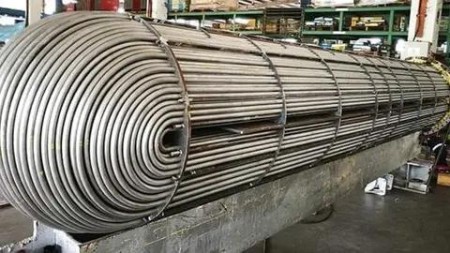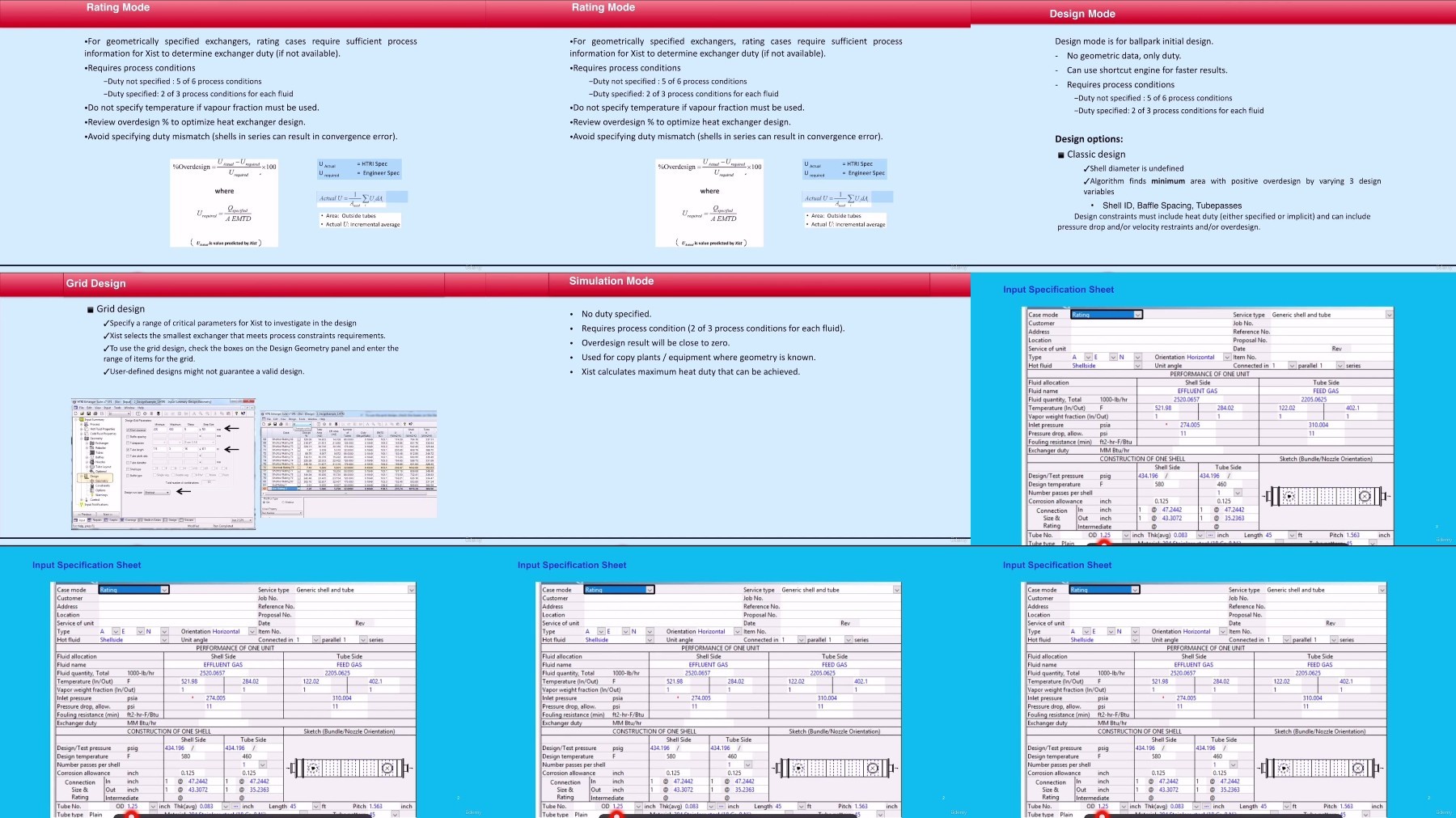Basics Of Heat Exchanger Design, Operation & Inspection

Basics Of Heat Exchanger Design, Operation & Inspection
Published 12/2023
MP4 | Video: h264, 1280x720 | Audio: AAC, 44.1 KHz
Language: English | Size: 1.05 GB | Duration: 2h 30m
Learn the Principles, Design Considerations of Heat Exchanger Design
What you'll learn
Types of Heat Exchangers
Causes of failure in heat exchangers
Heat exchangers design considerations
Good practices to avoid fouling
Heat transfer basics
Box Cooler / Bayonet. Cooler
Shell & Tube heat exchanger
TEMA nomenclature
AEW type heat exchanger
BEM type heat exchanger BEU type heat exchanger AET/S type heat exchanger BKU type he
BEU type heat exchanger
AET/S type heat exchanger
BKU type heat exchanger
Tube-side flow allocation
Exchanger component description covering tubes, shell and baffle
How to use HTRI software?
Requirements
Working towards a diploma or degree in engineering
Working in a process plant
Description
Heat Exchangers are part and parcel of the process plants. The design of heat exchangers is always done by specialists in an EPC company or in vendor office. Most of the time such people conduct only exchanger design. However, a process engineer, mechanical engineer or a plant operations professional may be required understand and exchanger design, specify an exchanger or trouble shoot an exchanger operation. They need to have an overall understanding of the design, construction, operation of the equipment in order to be effective.This course is intended to equip people intending to be in such positions of responsibility.The course contents are as belowIntroduction to Heat ExchangersTypes of Heat ExchangersCauses of failure in heat exchangersHeat exchangers design considerations Good practices to avoid foulingHeat transfer basicsBox Cooler / Bayonet. CoolerShell & Tube heat exchanger Welded plate type heat exchangerTEMA nomenclature, AEW type heat exchanger AEP type heat exchangerBEM type heat exchangerBEU type heat exchangerAET/S type heat exchangerBKU type heat exchangerExchanger basic components description Exchanger basic components: tubesExchanger basic components: shellExchanger basic components: baffleTube-side flow allocationHow to use HTRI software?Causes of failure in heat exchangersMore content with regard to operation, construction and inspection will be added soon.
Overview
Section 1: Introduction
Lecture 1 Introduction to Heat Exchangers
Lecture 2 Types of Heat Exchangers
Lecture 3 Causes of Failure in Heat Exchangers
Section 2: Heat Exchanger Design Considerations
Lecture 4 Heat Exchanger Design Logic
Lecture 5 Design Considerations - Heat Transfer Equation
Lecture 6 Design Considerations - Heat Transfer Coefficient
Lecture 7 Design Considerations - Effective Temperature Difference
Lecture 8 Design Considerations - Temperature Approach in Heat Exchanger
Lecture 9 Design Considerations - Fouling Factors affecting Heat Exchanger Design
Lecture 10 Good Practices to avoid fouling
Section 3: Heat Transfer Engineering
Lecture 11 Heat Transfer Basics
Lecture 12 Example on Conduction Heat Transfer
Lecture 13 Example on Radiation Heat Transfer
Lecture 14 Example on Radiation Heat Transfer
Section 4: Heat Exchanger Types
Lecture 15 Box Cooler / Bayonet Cooler
Lecture 16 Shell & Tube Exchanger
Lecture 17 Shell & Tube Exchanger - Floating Head
Lecture 18 Shell & Tube Exchanger - U-Tube Design
Lecture 19 Shell & Tube Exchanger - Re-boiler / Kettle Type Design
Section 5: TEMA Nomenclature & Exchanger Type
Lecture 20 TEMA Nomenclature - Channel Head Types
Lecture 21 TEMA Nomenclature - Rear End Types
Lecture 22 TEMA Nomenclature - Shell Types_1
Lecture 23 TEMA Nomenclature - Shell Types_2
Lecture 24 TEMA Nomenclature - Shell Types_3
Lecture 25 TEMA Nomenclature - Shell Types_4
Lecture 26 TEMA Nomenclature - Shell Types_5
Lecture 27 TEMA Nomenclature - Shell Types_6
Lecture 28 AEW Type Shell & Tube Exchanger
Lecture 29 AEP Type Shell & Tube Exchanger
Lecture 30 BEM Type Shell & Tube Exchanger
Lecture 31 BEUType Shell & Tube Exchanger
Lecture 32 AET/S Type Shell & Tube Exchanger
Lecture 33 BKU Type Shell & Tube Exchanger
Section 6: Shell & Tube Exchanger Components
Lecture 34 Exchanger Basic Component Description
Lecture 35 Basic Components -Tubes
Lecture 36 Basic Components -Tubes & Tubesheet
Lecture 37 Basic Components -Tubes Continued
Lecture 38 Basic Components -Baffles
Lecture 39 Shell & Tube Exchanger - Fixed Tube Sheet Design
Lecture 40 Basic Components -Shell
Lecture 41 Tubeside flow allocation
Lecture 42 Criteria for Selection and Allocation of Fluid to Shell & ube
Section 7: HTRI software for Exchanger design
Lecture 43 Using HTRI Software-1
Lecture 44 Using HTRI Software-2
Section 8: Tips for quick design / construction type
Lecture 45 Fixed tube-sheet construction
Lecture 46 U tube type construction
Lecture 47 Floating head type construction
Lecture 48 Tips for quick tube side design checks
Anyone who is curious about heat exchanger design, operation

https://filestore.me/yotkzw5yfebh/.Basics.of.Heat.Exchanger.Design.Operation..Inspection.2023-12.rar
What you'll learn
Types of Heat Exchangers
Causes of failure in heat exchangers
Heat exchangers design considerations
Good practices to avoid fouling
Heat transfer basics
Box Cooler / Bayonet. Cooler
Shell & Tube heat exchanger
TEMA nomenclature
AEW type heat exchanger
BEM type heat exchanger BEU type heat exchanger AET/S type heat exchanger BKU type he
BEU type heat exchanger
AET/S type heat exchanger
BKU type heat exchanger
Tube-side flow allocation
Exchanger component description covering tubes, shell and baffle
How to use HTRI software?
Requirements
Working towards a diploma or degree in engineering
Working in a process plant
Description
Heat Exchangers are part and parcel of the process plants. The design of heat exchangers is always done by specialists in an EPC company or in vendor office. Most of the time such people conduct only exchanger design. However, a process engineer, mechanical engineer or a plant operations professional may be required understand and exchanger design, specify an exchanger or trouble shoot an exchanger operation. They need to have an overall understanding of the design, construction, operation of the equipment in order to be effective.This course is intended to equip people intending to be in such positions of responsibility.The course contents are as belowIntroduction to Heat ExchangersTypes of Heat ExchangersCauses of failure in heat exchangersHeat exchangers design considerations Good practices to avoid foulingHeat transfer basicsBox Cooler / Bayonet. CoolerShell & Tube heat exchanger Welded plate type heat exchangerTEMA nomenclature, AEW type heat exchanger AEP type heat exchangerBEM type heat exchangerBEU type heat exchangerAET/S type heat exchangerBKU type heat exchangerExchanger basic components description Exchanger basic components: tubesExchanger basic components: shellExchanger basic components: baffleTube-side flow allocationHow to use HTRI software?Causes of failure in heat exchangersMore content with regard to operation, construction and inspection will be added soon.
Overview
Section 1: Introduction
Lecture 1 Introduction to Heat Exchangers
Lecture 2 Types of Heat Exchangers
Lecture 3 Causes of Failure in Heat Exchangers
Section 2: Heat Exchanger Design Considerations
Lecture 4 Heat Exchanger Design Logic
Lecture 5 Design Considerations - Heat Transfer Equation
Lecture 6 Design Considerations - Heat Transfer Coefficient
Lecture 7 Design Considerations - Effective Temperature Difference
Lecture 8 Design Considerations - Temperature Approach in Heat Exchanger
Lecture 9 Design Considerations - Fouling Factors affecting Heat Exchanger Design
Lecture 10 Good Practices to avoid fouling
Section 3: Heat Transfer Engineering
Lecture 11 Heat Transfer Basics
Lecture 12 Example on Conduction Heat Transfer
Lecture 13 Example on Radiation Heat Transfer
Lecture 14 Example on Radiation Heat Transfer
Section 4: Heat Exchanger Types
Lecture 15 Box Cooler / Bayonet Cooler
Lecture 16 Shell & Tube Exchanger
Lecture 17 Shell & Tube Exchanger - Floating Head
Lecture 18 Shell & Tube Exchanger - U-Tube Design
Lecture 19 Shell & Tube Exchanger - Re-boiler / Kettle Type Design
Section 5: TEMA Nomenclature & Exchanger Type
Lecture 20 TEMA Nomenclature - Channel Head Types
Lecture 21 TEMA Nomenclature - Rear End Types
Lecture 22 TEMA Nomenclature - Shell Types_1
Lecture 23 TEMA Nomenclature - Shell Types_2
Lecture 24 TEMA Nomenclature - Shell Types_3
Lecture 25 TEMA Nomenclature - Shell Types_4
Lecture 26 TEMA Nomenclature - Shell Types_5
Lecture 27 TEMA Nomenclature - Shell Types_6
Lecture 28 AEW Type Shell & Tube Exchanger
Lecture 29 AEP Type Shell & Tube Exchanger
Lecture 30 BEM Type Shell & Tube Exchanger
Lecture 31 BEUType Shell & Tube Exchanger
Lecture 32 AET/S Type Shell & Tube Exchanger
Lecture 33 BKU Type Shell & Tube Exchanger
Section 6: Shell & Tube Exchanger Components
Lecture 34 Exchanger Basic Component Description
Lecture 35 Basic Components -Tubes
Lecture 36 Basic Components -Tubes & Tubesheet
Lecture 37 Basic Components -Tubes Continued
Lecture 38 Basic Components -Baffles
Lecture 39 Shell & Tube Exchanger - Fixed Tube Sheet Design
Lecture 40 Basic Components -Shell
Lecture 41 Tubeside flow allocation
Lecture 42 Criteria for Selection and Allocation of Fluid to Shell & ube
Section 7: HTRI software for Exchanger design
Lecture 43 Using HTRI Software-1
Lecture 44 Using HTRI Software-2
Section 8: Tips for quick design / construction type
Lecture 45 Fixed tube-sheet construction
Lecture 46 U tube type construction
Lecture 47 Floating head type construction
Lecture 48 Tips for quick tube side design checks
Anyone who is curious about heat exchanger design, operation

https://filestore.me/yotkzw5yfebh/.Basics.of.Heat.Exchanger.Design.Operation..Inspection.2023-12.rar
